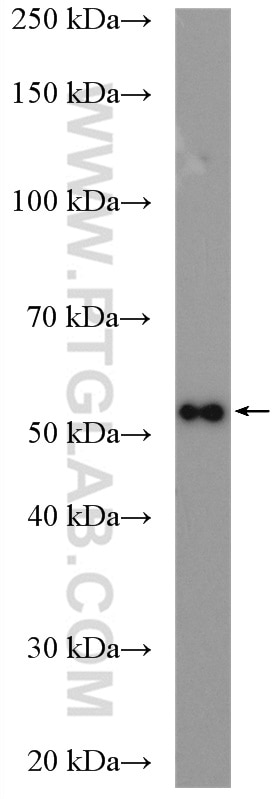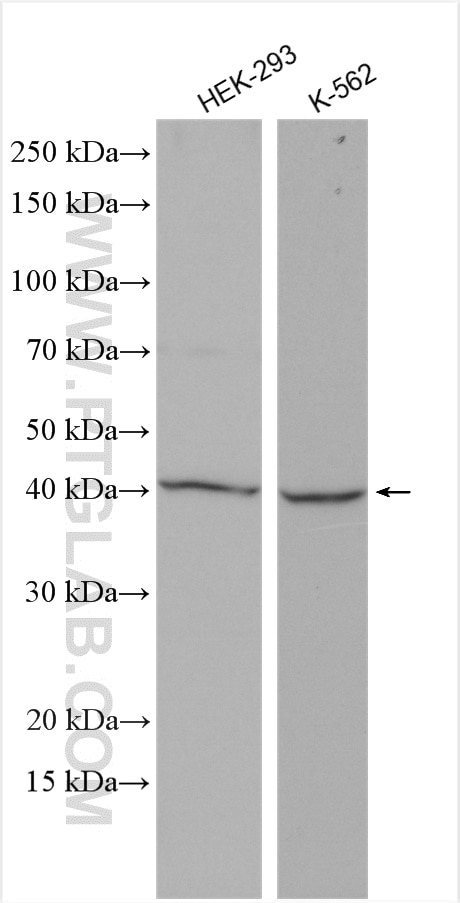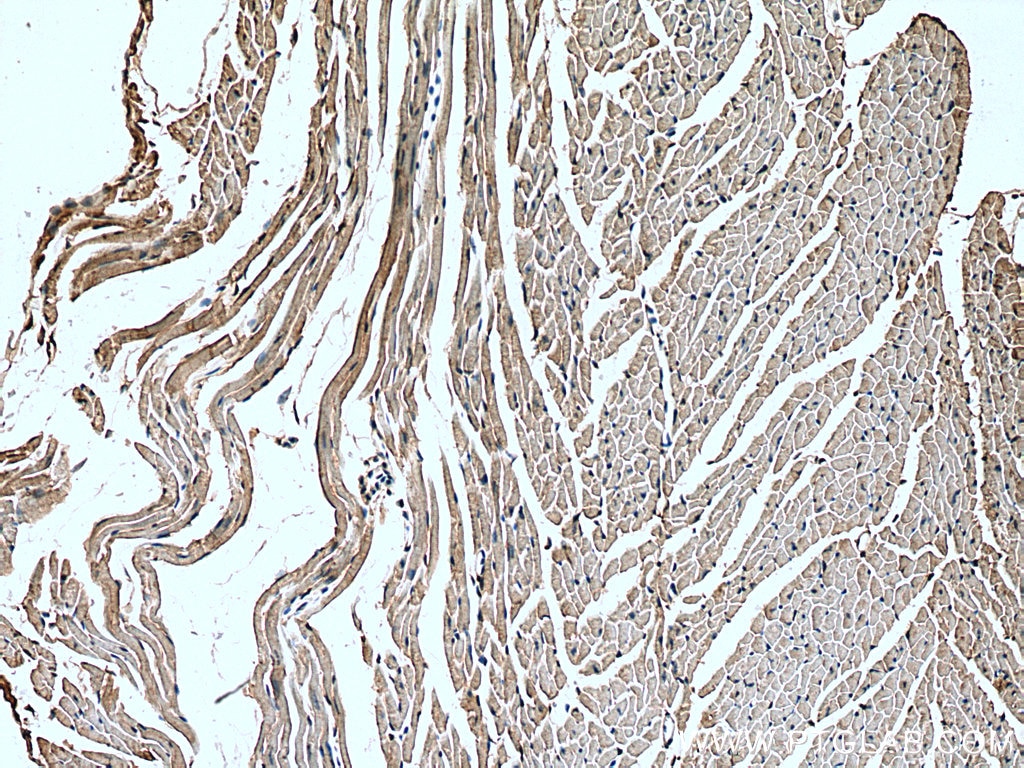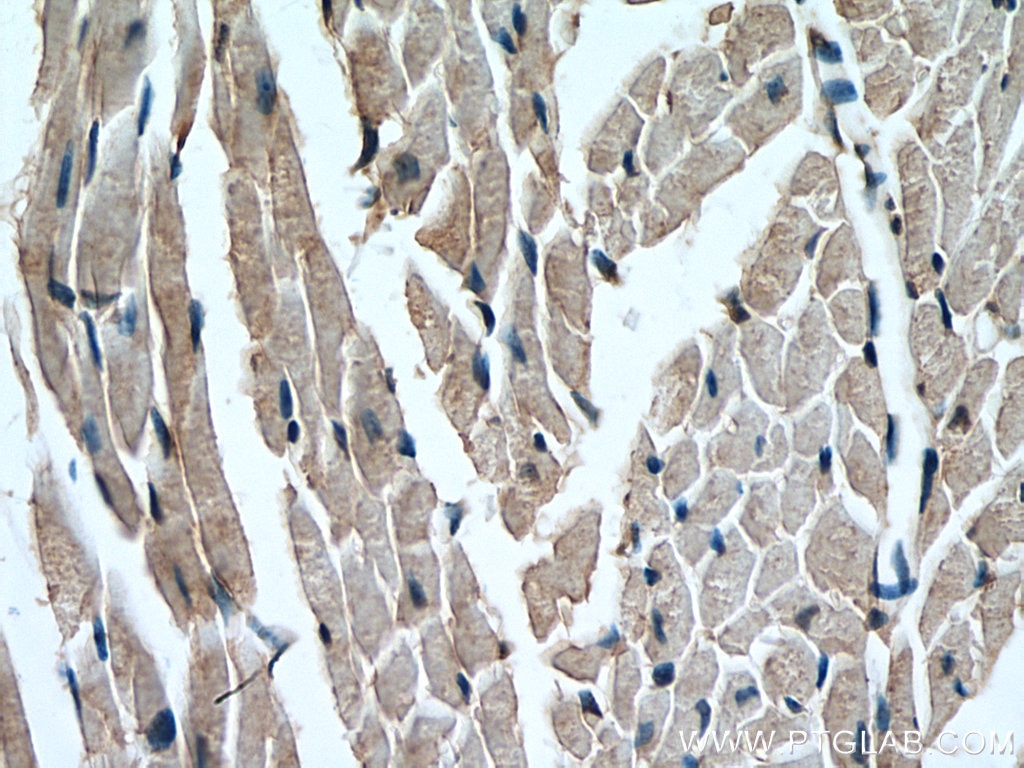Anticorps Polyclonal de lapin anti-MCT2
MCT2 Polyclonal Antibody for WB, IHC, ELISA
Hôte / Isotype
Lapin / IgG
Réactivité testée
Humain, souris et plus (1)
Applications
WB, IF, IHC, ELISA
Conjugaison
Non conjugué
N° de cat : 20355-1-AP
Synonymes
Galerie de données de validation
Applications testées
| Résultats positifs en WB | cellules SH-SY5Y, cellules HEK-293, cellules K-562 |
| Résultats positifs en IHC | tissu cardiaque de souris, il est suggéré de démasquer l'antigène avec un tampon de TE buffer pH 9.0; (*) À défaut, 'le démasquage de l'antigène peut être 'effectué avec un tampon citrate pH 6,0. |
Dilution recommandée
| Application | Dilution |
|---|---|
| Western Blot (WB) | WB : 1:500-1:1000 |
| Immunohistochimie (IHC) | IHC : 1:50-1:500 |
| It is recommended that this reagent should be titrated in each testing system to obtain optimal results. | |
| Sample-dependent, check data in validation data gallery | |
Applications publiées
| WB | See 4 publications below |
| IF | See 1 publications below |
Informations sur le produit
20355-1-AP cible MCT2 dans les applications de WB, IF, IHC, ELISA et montre une réactivité avec des échantillons Humain, souris
| Réactivité | Humain, souris |
| Réactivité citée | rat, Humain, souris |
| Hôte / Isotype | Lapin / IgG |
| Clonalité | Polyclonal |
| Type | Anticorps |
| Immunogène | MCT2 Protéine recombinante Ag14201 |
| Nom complet | solute carrier family 16, member 7 (monocarboxylic acid transporter 2) |
| Masse moléculaire calculée | 478 aa, 52 kDa |
| Poids moléculaire observé | 40-52 kDa |
| Numéro d’acquisition GenBank | BC030693 |
| Symbole du gène | MCT2 |
| Identification du gène (NCBI) | 9194 |
| Conjugaison | Non conjugué |
| Forme | Liquide |
| Méthode de purification | Purification par affinité contre l'antigène |
| Tampon de stockage | PBS avec azoture de sodium à 0,02 % et glycérol à 50 % pH 7,3 |
| Conditions de stockage | Stocker à -20°C. Stable pendant un an après l'expédition. L'aliquotage n'est pas nécessaire pour le stockage à -20oC Les 20ul contiennent 0,1% de BSA. |
Informations générales
SLC16A7, also named MCT2, is a proton-coupled monocarboxylate transporter catalyzing the rapid transport across the plasma membrane of many monocarboxylates. It has been reported that SLC16A7 is the primary monocarboxylate transporter in Purkinje cells and can be detected in the brain, cerebellum, liver, and kidney, but not in vascular smooth muscle cells, pericytes, endothelium, heart, lung, or stomach. There are some isoforms of SLC16A7 with bands around 52 kDa and 40-45 kDa in SDS-PAGE. The 80 kDa protein might be the dimer similar to the papers published. (PMID: 9482213, 15749979, 11291733, 16901736)
Protocole
| Product Specific Protocols | |
|---|---|
| WB protocol for MCT2 antibody 20355-1-AP | Download protocol |
| IHC protocol for MCT2 antibody 20355-1-AP | Download protocol |
| Standard Protocols | |
|---|---|
| Click here to view our Standard Protocols |
Publications
| Species | Application | Title |
|---|---|---|
Br J Cancer Autoregulation of H+/lactate efflux prevents monocarboxylate transport (MCT) inhibitors from reducing glycolytic lactic acid production. | ||
Anim Cells Syst (Seoul) MCT2 overexpression promotes recovery of cognitive function by increasing mitochondrial biogenesis in a rat model of stroke. | ||
J Exp Clin Cancer Res ROS/PI3K/Akt and Wnt/β-catenin signalings activate HIF-1α-induced metabolic reprogramming to impart 5-fluorouracil resistance in colorectal cancer. | ||
Biomed Pharmacother Fibroblast growth factor 21 protects the liver from apoptosis in a type 1 diabetes mouse model via regulating L-lactate homeostasis |





